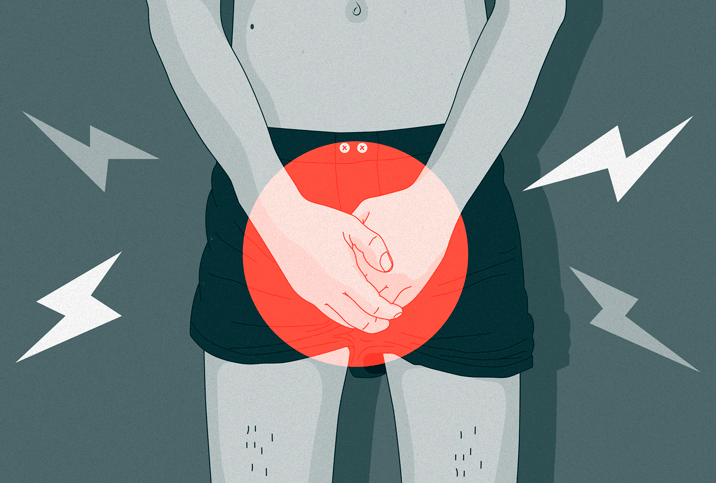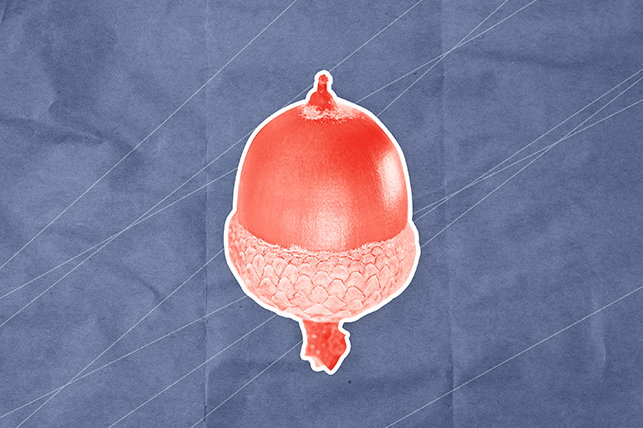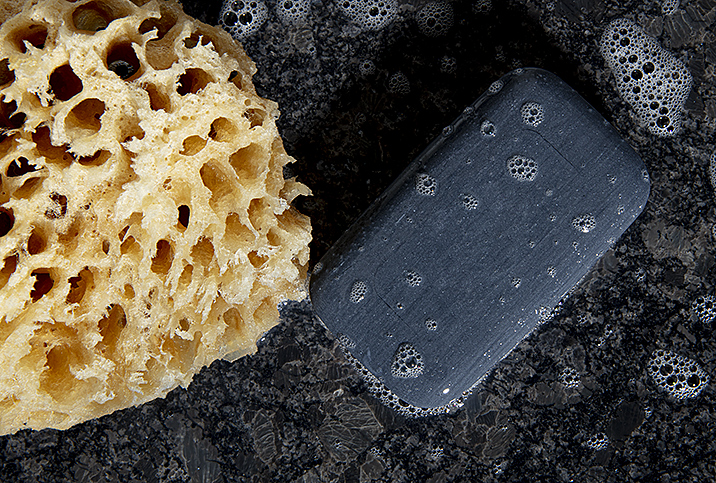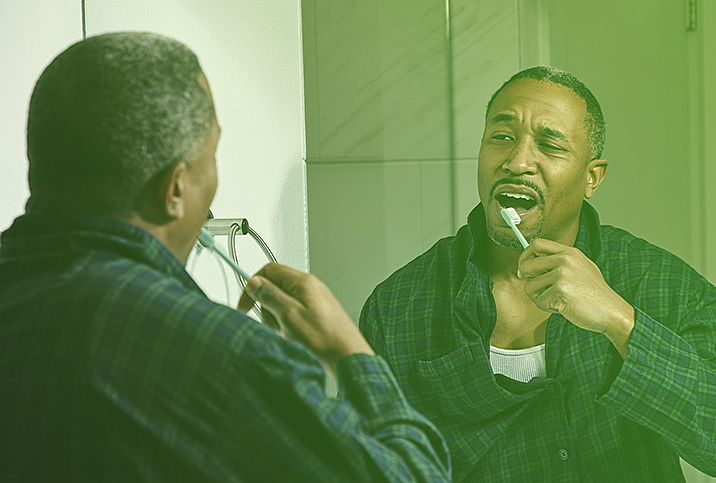Treating Balanitis and Preventing It From Coming Back

The mysteries of male genitalia never seem to end.
Balanitis—a common, if annoying irritation of the penis—is typified by the penis head being red, itchy, irritated and sometimes painful. It occurs most frequently in uncircumcised men and boys, although anyone with a penis is a potential candidate to develop it. Up to 10 percent of males experience this condition at some point.
It can sometimes be accompanied by a discharge or an excess of smegma, which is thick, white, pasty goo that sometimes accumulates underneath the foreskin. Balanitis can be mistaken for a sexually transmitted infection (STI), which it isn't, but the irritation of balanitis can be caused by an STI.
For people who don't have other comorbidities and get it treated promptly—there are easy ways and hard ways—balanitis is often a brief annoyance that disappears soon enough, but that isn't always the case. Though it can be resolved quickly, don't ignore balanitis in the hopes it will go away on its own, and take precautions to make sure it doesn't come back.
Treat balanitis the easy way
If you visit your healthcare provider's office at the first signs of balanitis and don't have any other comorbidities or complications, it's typically not a terribly serious condition. Nor is it difficult to treat. You do, though, need treatment, and the "easy way" is the preferred way.
A balanitis diagnosis usually doesn't require much more than a visual exam by a doctor. It presents mostly on the skin of the penis head. A doctor doesn't need to take a culture or get samples to send to the lab, such as they might have to do with an STI or another issue. This means you can walk out of the clinic with your balanitis treatment in hand.
"Typically, the first line would be an antifungal cream like clotrimazole or an antibiotic ointment, so you typically start with a topical," said Neel Parekh, M.D., a men's fertility and sexual health specialist with Cleveland Clinic. "If the topicals aren't effective or aren't working, then you can also try a mild topical steroid cream. And if that doesn't work, you can switch to an oral antibiotic or oral antifungal."
Your healthcare provider might also recommend an anti-itch cream if the irritation is particularly unbearable.
Another balanitis "treatment" is up to you. Take a close look at your genital hygiene practices, especially if you are uncircumcised. Wash daily with gentle soap and dry the area thoroughly.
To be clear, uncircumcised penises are not inherently less clean than circumcised ones. The anatomy of a foreskin, particularly the way it makes contact with the penis head, simply makes it more difficult to keep the area clean and dry.
Guys who have phimosis, an unusually tight foreskin, have an especially difficult time with hygiene.
Interestingly, irritation can be caused by over-washing, too. Harsh antibiotic soaps, especially heavily perfumed ones, can sometimes be a cause of balanitis.
Treat balanitis the hard way
If creams, ointments and improved hygiene don't work and the balanitis keeps coming back, it can cause some significant problems. Constant irritation of the sensitive skin of the penis head and foreskin can cause scarring. In turn, this can cause the urethra to get narrow and result in urinary tract infections (UTIs), which can create further irritation and build up even more scar tissue.
In a role reversal, chronic balanitis can itself lead to phimosis because of the scarring and tightening of the foreskin.
We covered the easy ways to treat balanitis.
"If it's recurrent and the guy isn't circumcised, circumcision is an option, particularly if they've developed phimosis," Parekh said. "So if it's needed, we can do a circumcision."
Luckily, adult circumcision is increasingly common. Some standalone clinics are devoted solely to the practice, and the procedure is safe and relatively painless.
Living with balanitis until it clears up
Mostly, living with balanitis while you're treating it means consciously applying the prescribed topical treatment and paying attention to keeping the area clean and dry. Avoid sex for a few days until the major irritation goes away and wear loose-fitting, clean underwear that doesn't irritate your genital skin.
If it recurs and you don't have other comorbidities such as high blood sugar or excess weight, talk to your doctor about condoms that don't use harsh spermicides and try non-latex brands. Latex condoms have been known to cause the kind of irritation that can develop into balanitis.
Men who ignore balanitis can develop irritation that causes scarring or irritation of the foreskin.
"Some guys can get something called balanoposthitis, which is the inflammation of the head of the penis and the foreskin for guys that are uncircumcised," Parekh said. "But balanitis is just the head of the penis, so that can be someone who is circumcised or uncircumcised."
How to keep balanitis from coming back
The primary preventive measure for balanitis is practicing good hygiene, especially for guys with an intact foreskin. Maintaining good general health goes a long way toward preventing secondary issues like balanitis as well.
Here are a few other tips to avoid balanitis:
- Pull back the foreskin and wash the area daily using a gentle soap
- Pat the area dry after washing
- Use condoms to prevent STIs that can cause balanitis
- Try latex-free condoms if irritation persists
- Wear clean, loose-fitting underwear
- Change out of wet or sweaty clothes promptly
- Maintain a healthy body weight
- Watch your blood sugar level
Remember, balanitis is a common, easily treatable condition, but one that poses more serious risks if left untreated. Simple hygiene protocols can go a long way to preventing these kinds of issues.
Are you concerned balanitis might be an issue but you don't have a regular doctor? You should get one. Fortunately, telehealth makes it easy to connect with a healthcare professional who can evaluate your situation. Many physicians offer same-day video visits. Giddy Telehealth is an easy-to-use online portal that provides access to hundreds of healthcare professionals whose expertise covers the full scope of medical care, including men's health.


















